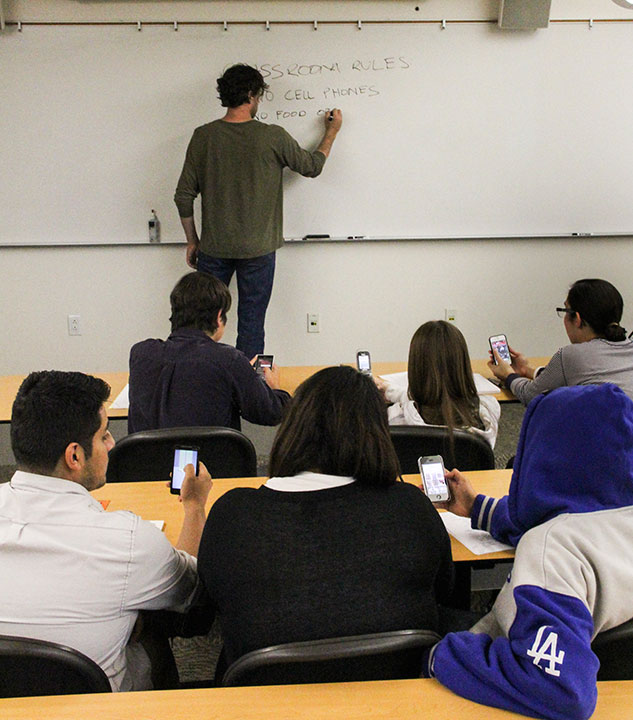There is no denying that cellphones, in particular smart phones, have made people’s lives easier. If you need to call someone, no need to stop at a payphone when you have a phone in your pocket. Need to look up directions? That same phone probably contains GPS. However, there is one place where cellphones have not always been welcomed with open arms: the classroom.

Photo Illustration
There are those professors who feel handheld devices like cellphones or tablets can help improve the classroom learning experience. Michael Gougis, journalism instructor, is not one of them.
“There are circumstances which I could see a hand held electronic device being a useful classroom tool,” Gougis said. “But there are [also] times where I can see a handgun being a useful classroom tool.”
Gougis explained the problem is that cell phones attract your attention when it should be focused on the instructor.
“Nobody can look at a cellphone, answer a text message and pay attention at the same time. Your brain cannot do two things at once,” he said. “You’re going back and forth between two different things and you miss things. There’s no such thing as multitasking, any psychologist will tell you that.”
Barbara Leos, speech, agrees that cellphones are not only a distraction but they can be harmful to the learning process.
“When you use your cellphone in class its hurting you because your missing out on what the professor is saying,” said Leos.
Sandy Lee, design tech instructor, feels that if done properly, technology in the classroom can be beneficiary to the student learning incoming.
“It really depends on how you incorporate technology as a teaching tool. It’s not to say one way is better than the other. If it is incorporated meaningfully as a way to learn I think it’s very beneficial,” said Lee.
Alex Matei, audio engineering, disagrees with the zero tolerance cellphone rule and feels that cellphone usage should depend on the instructor’s policy.
“I have had both classes and it depends on the class. When you’re allowed to [text], students are still able to focus. I haven’t noticed a problem. I do it myself but I feel I could be trusted to discern when it’s a good time to text and when I should be focused in the class,” said Matei.
Tikhon Schnitke, music, believes it is rude to use a phone during class, regardless of the professor’s policy.
“Even if the professor doesn’t mind it is not something you should do. Texting in class is not right. Unless it’s an emergency,” said Schnitke.
- Columbus deserves his day - October 17, 2014
- Struggles continue for women’s water polo - October 16, 2014
- Root Root for the away team? - October 8, 2014

I am surprised the comment was even printed from Michael Gougis. Sadly, I am not surprised that he is an instructor at our dwindling school, as this seems to be par for our educational course these days. Idiots citing handguns as useful classroom tools, professors defaming other professors in front of their class, and professors discussing the mechanics of bullets through the human skull during a business class.
Also, Michael, the words you were looking for were neuroscientist and focus, not psychologist and do. While it may be true that a neuroscientist will tell you that you cannot focus on two things at once, they will also tell you that the brain switches tasks at such a high rate of speed that there is a nominal difference when at least one of the tasks happens to be something like a short text.